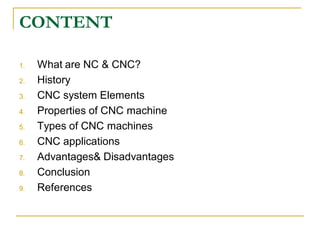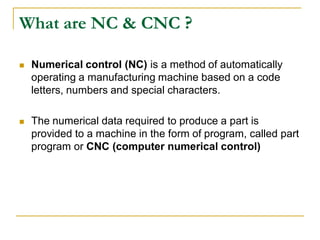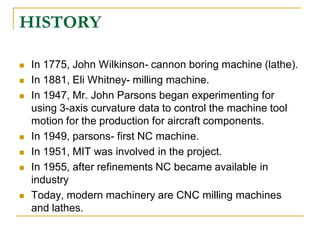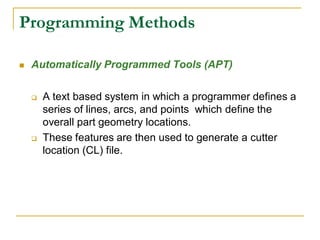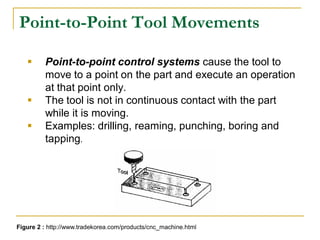Cnc detail
- 1. Computer Numerical Control (CNC) Banu Akar Neşe Kaynak Duygu Gökçe Meltem Erdi Hacettepe University Chemical Engineering Department 22.12.2010
- 2. CONTENT 1. What are NC & CNC? 2. History 3. CNC system Elements 4. Properties of CNC machine 5. Types of CNC machines 6. CNC applications 7. Advantages& Disadvantages 8. Conclusion 9. References
- 3. What are NC & CNC ? ÔÅÆ Numerical control (NC) is a method of automatically operating a manufacturing machine based on a code letters, numbers and special characters. ÔÅÆ The numerical data required to produce a part is provided to a machine in the form of program, called part program or CNC (computer numerical control)
- 4. What are NC & CNC ? ÔÅÆ The program is translated into the appropriate electrical signals for input to motors that run the machine. ÔÅÆ A CNC machine is an numerical control machine with the added feature of an on board computer. The computer is referred to as the machine control unit (MCU)
- 5. HISTORY ÔÅÆ In 1775, John Wilkinson- cannon boring machine (lathe). ÔÅÆ In 1881, Eli Whitney- milling machine. ÔÅÆ In 1947, Mr. John Parsons began experimenting for using 3-axis curvature data to control the machine tool motion for the production for aircraft components. ÔÅÆ In 1949, parsons- first NC machine. ÔÅÆ In 1951, MIT was involved in the project. ÔÅÆ In 1955, after refinements NC became available in industry ÔÅÆ Today, modern machinery are CNC milling machines and lathes.
- 6. CNC SYSTEM ELEMENTS A typical CNC system consists of the following six elements ÔÅÆ Part program ÔÅÆ Program input device ÔÅÆ Machine control unit ÔÅÆ Drive system ÔÅÆ Machine tool ÔÅÆ Feedback system Figure 1 : Schematic illustration of the major components of a numerical control machine tool
- 7. Basic Concept of Part Programming  Part programming contains geometric data about the part and motion information to move the cutting tool with respect to the work piece.  Basically, the machine receives instructions as a sequence of blocks containing commands to set machine parameters; speed, feed and other relevant information.  A block is equivalent to a line of codes in a part program.  N135 G01 X1.0 Y1.0 Z0.125 T01 F5.0 Block number Coordinates Special function Tool number G-code
- 8. Programming Methods  Automatically Programmed Tools (APT)  A text based system in which a programmer defines a series of lines, arcs, and points which define the overall part geometry locations.  These features are then used to generate a cutter location (CL) file.
- 9. Programming Methods  Computer Aided Machining (CAM) Systems- Computer Aided Design (CAD) Systems  CAD/CAM systems allow for rapid development and modifying of designs and documentation.  The 3D geometric model produced becomes a common element for engineering analysis (FEA), machining process planning (including CNC part programming, documentation (including engineering drawings), quality control, and so on.
- 10. Drives of CNC machine tool  Hydraulic actuator - high power machine tool  Stepping motor - small machine due to limited power and torque  DC motor - excellent speed regulation, high torque, most widely used
- 11. Properties of CNC machines  Based on Motion Type: Motion control - the heart of CNC Point-to-Point or Continuous path  Based on Control Loops: Open loop or Closed loop  Based on Power Supply: Electric or Hydraulic or Pneumatic  Based on Positioning System Incremental or Absolute
- 12. Point-to-Point Tool Movements ÔÇß Point-to-point control systems cause the tool to move to a point on the part and execute an operation at that point only. ÔÇß The tool is not in continuous contact with the part while it is moving. ÔÇß Examples: drilling, reaming, punching, boring and tapping. Figure 2 : http://www.tradekorea.com/products/cnc_machine.html
- 13. Continuous-Path Tool Movements ÔÇß Continuous-path controllers cause the tool to maintain continuous contact with the part as the tool cuts a contour shape. ÔÇß These operations include milling along any lines at any angle, milling arcs and lathe turning. Figure 3: http://kaymak06.50webs.com/cnc.html
- 14. Loop Systems for Controlling Tool Movement Schematic illustration of the components of (a) an open-loop and (b) a closed-loop control system for a CNC machine. Figure 4 : http://www.nd.edu/~manufact/MET%20pdf_files/MET_Ch37.pdf
- 15. Types of CNC Machines ÔÅÆ Lathe Machine ÔÅÆ Milling Machine ÔÅÆ Drilling Machine The bench drill The pillar drill ÔÅÆ Boring Machine ÔÅÆ Grinding Machine
- 16. Types of CNC Machines CNC Mills ÔÇß These machining centers use computer controls to cut different materials. ÔÇß They are able to translate programs consisting of specific number and letters to move the spindle to various locations and depths. ÔÇß Used to make 3D prototypes, moulds, cutting dies, printing plates and sights. Figure 5 :http://huayucnc.win.mofcom.gov.cn/en/plate01/product.asp?id=24916
- 17. Types of CNC Machines CNC Lathes ÔÇß They cut metal that is often turning at fast speeds. ÔÇß CNC lathes are able to make fast, precision cuts using indexable tools and drills with complicated programs.Normally, they cannot be cut on manual lathes. ÔÇß They often include 12 tool holders and coolant pumps to cut down on tool wear. Figure 6 :http://www.automation-drive.com/cnc-lathe-machine
- 18. Types of CNC Machines Turning Centers are capable of executing many different types of lathe cutting operations simultaneously on a rotating part. Figure 7 : http://www.cnc-machining-center-yida.com/cnc-turning-center-bml-420.htm
- 19. Types of CNC Machines CNC Grinders ÔÇß Grinding metal process uses a coated wheel that slowly removes metal to create a part. ÔÇß Through the years, grinding was done on a manual machine, but with the advent of CNC technology, the grinding process has advanced Figure 8 :http://cnc-machine-center.blogspot.com/2008/09/cnc-surface-grinding-machine.html
- 20. Types of CNC Machines CNC DRILLING Drilling is commonly used for mass production. The drilling machine (drilling press) is used to create or enlarge holes. Drilling machine for different jobs; The bench drill: For drilling holes through raw materials such as wood, plastic and metal The pillar drill: A larger version that stands upright on the floor. As the bench drill, it can be used to drill larger pieces of materials and produce bigger holes. Figure 9 : http://www.metalshopsolutions.com/
- 21. Types of CNC Machines CNC Boring ÔÅÆ Process of enlarging an existing hole or internal cylindirical surface. ÔÅÆ This can be accomplished on a lathe or a machine tool specifically designed for the process, such as a horizontal boring machine. Figure 10:http://cadcamcnccenter.com/cadcamthai/cnc/machine/108-what-is-cnc.html
- 22. Types of CNC Machines Electrical Discharge Machines (EDM) Wire EDM machines utilize a very thin wire (.0008 to .012 in.) as an electrode. The wire is stretched between diamond guides and carbide that conduct current to the wire and cuts the part like a band saw. Material is removed by the erosion caused by a spark that moves horizontally with the wire. Figure 11: http://news.thomasnet.com/news/machinery-machining-tools/electro-discharge-machines
- 23. Types of CNC Machines Laser Cutting Machines ÔÇß The machine utilizes an intense beam of focused laser light to cut the part. ÔÇß Material under the beam experiences a rapid rise in temperature and is vaporized. ÔÇß Laser cuts with a minimum of distortion, no mechanical cutting forces. Figure 12 :http://zaipul.wikispaces.com/file/view/01+Introduction+to+CNC+Technology.pdf
- 24. Specific tools to perform different operations Figure 13: http://users.isr.ist.utl.pt/~pjcro/courses/api0910/API_I_C5.pdf
- 25. Specific tools to perform different operations Figures 14: http://users.isr.ist.utl.pt/~pjcro/courses/api0910/API_I_C5.pdf
- 26. APPLICATION of CNC MACHINES ÔÇß cutting ÔÇß drilling ÔÇß milling ÔÇß welding ÔÇß boring ÔÇß bending ÔÇß spinning ÔÇß pinning ÔÇß gluing ÔÇß sewing ÔÇß routing
- 27. Application of CNC in Some Industries ÔÅÆ Automotive Industry ÔÅÆ Aerospace Industry ÔÅÆ Machinery Industry ÔÅÆ Electrical Industry ÔÅÆ Instrumentation Industry
- 28. Automotive Industry Different Products Figure 15:http://www.efunda.com/eds/company_details.cfm/id2/4846/pv/NO/cp/Zhejiang%2020Co
- 29. Aerospace Industry Aircraft Turbine Machined by 5-Axis CNC Milling Machine Figure 16: http://boeingcockpit.com/html
- 30. Advantages of CNC Machines Ease of Use  CNC machines are easier for beginners  operation of several CNC machines at same time  some CNC machines don’t need any operator ●call their operator in case of the emergencies. High Efficiency  operate almost continuously 24 hours a day, 365 days a year
- 31. Expanding Options ÔÅÆ Expand the machine's capabilities with Software changes and updates No Prototyping ÔÅÆ New programmes provide elimination build a prototype, save time and money Precision ÔÅÆ Parts are identical to each other
- 32. Reduce Waste ÔÅÆ Reduce waste as errors allows minimize wasted material.
- 33. Disadvantage of CNC Machines Cost CNC machinery: ÔÅÆ costs quite a lot more than conventional machinery ÔÅÆ does not eliminate the need for expensive tools ÔÅÆ expensive to repair
- 34. CONCLUSION ÔÅÆ CNC machines which are applicable any type of processing ÔÅÆ manufacturing anything is identical in shorter time ÔÅÆ CNC machines provide many advantages ÔÅÆ many industries prefer using CNC machines
- 35. Thank you ‚òª
- 36. REFERENCES ÔÅÆ http://www.ehow.com/about_5415088_types-cnc-machines.html ÔÅÆ http://www.cncci.com/resources/articles/what%20is%20cnc.htm ÔÅÆ http://www.bracingsystemsinc.com/basic-motion-types-in-a-cnc-machine ÔÅÆ http://www.madehow.com/Volume-2/CNC-Machine-Tool.html ÔÅÆ http://dget.nic.in/lisdapp/Trade/syllabus/pdf/TTCNC.pdf ÔÅÆ http://users.isr.ist.utl.pt/~pjcro/courses/api0910/API_I_C5.pdf ÔÅÆ http://www.tradekorea.com/products/cnc_machine.html ÔÅÆ http://kaymak06.50webs.com/cnc.html ÔÅÆ http://www.nd.edu/~manufact/MET%20pdf_files/MET_Ch37.pdf ÔÅÆ http://huayucnc.win.mofcom.gov.cn/en/plate01/product.asp?id=24916 ÔÅÆ http://www.automation-drive.com/cnc-lathe-machine ÔÅÆ http://www.cnc-machining-center-yida.com/cnc-turning-center-bml-420.htm ÔÅÆ http://cnc-machine-center.blogspot.com/2008/09/cnc-surface-grinding-machine.html ÔÅÆ http://cadcamcnccenter.com/cadcamthai/cnc/machine/108-what-is-cnc ÔÅÆ http://news.thomasnet.com/news/machinery-machining-tools/electro-discharge-machines ÔÅÆ http://zaipul.wikispaces.com/file/view/01+Introduction+to+CNC+Technology.pdf ÔÅÆ http://www.metalshopsolutions.com/ ÔÅÆ http://www.efunda.com/eds/company_details.cfm/id2/4846/pv/NO/cp/Zhejiang%2020Com ÔÅÆ http://boeingcockpit.com/html ÔÅÆ http://www.westone.wa.gov.au/toolbox8/furniture/toolbox/shared/resources_mw/ask_expert /tony/advantages.htm


